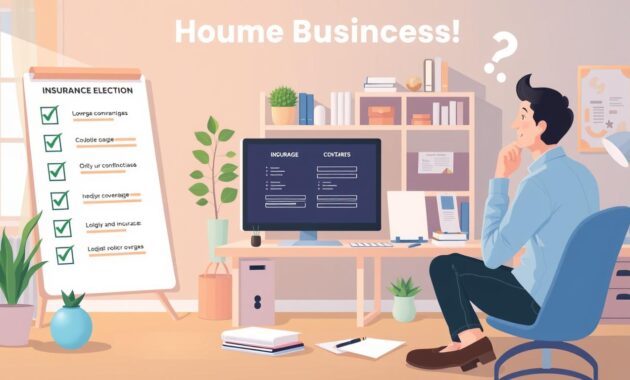Running a home-based business means you need the right insurance. Finding the right policy can seem hard. But, with the right info, you can get affordable coverage that protects your business.
This article will guide you through affordable home business insurance plans. You’ll learn about the key coverage options, common risks, and how to find the best policy for your business.
Key Takeaways
- Explore a variety of affordable home business insurance plans tailored to protect your enterprise
- Understand the core coverage types and minimum requirements for home-based businesses
- Identify common risks and liabilities faced by home entrepreneurs and how insurance can mitigate them
- Learn about cost factors that influence home business insurance rates and ways to save money
- Discover top insurance providers for home-based businesses and compare coverage options
Understanding Home Business Insurance Coverage Basics
As a home-based business owner, knowing the basics of business insurance is key. Home business insurance covers many types of protection. It helps keep your business safe from risks and legal issues.
Types of Basic Coverage Protection
Common types of insurance for home businesses include general liability, property insurance, professional liability, and workers’ compensation. These coverages protect your business from financial losses. They help with accidents, claims from others, property damage, and issues with employees.
Essential Insurance Components for Home Enterprises
Home businesses might also need extra policies like cyber liability, business interruption, and commercial auto insurance. These extra policies offer more protection. They help with risks specific to businesses run from home.
Minimum Coverage Requirements
Every home business has different needs for insurance. But, there are some basics everyone should have. These include general liability, property insurance, and sometimes workers’ compensation. Talking to an insurance expert can help find the right coverage for your business.
| Coverage Type | Description | Minimum Recommended Limits |
|---|---|---|
| General Liability | Protects against third-party claims of bodily injury, property damage, and personal/advertising injury | $1,000,000 per occurrence, $2,000,000 aggregate |
| Property Insurance | Covers physical damage to your business property, including equipment, inventory, and furnishings | Replacement cost coverage for all business assets |
| Professional Liability | Protects against claims of negligence, errors, or omissions in your professional services | $1,000,000 per claim, $2,000,000 aggregate |
| Workers’ Compensation | Provides coverage for medical expenses and lost wages for employees injured on the job | Minimum coverage required by state laws |
Knowing the business insurance basics, coverage types, and essential protection is vital. It helps protect your home business from risks and legal issues.
Why Your Home-Based Business Needs Dedicated Insurance
As a home-based business owner, you might think your homeowners or renters insurance is enough. But, it’s not enough to protect your business from big risks and liabilities. You need dedicated business insurance to keep your business safe and covered.
Business insurance is made for home-based businesses. It covers things like property damage, theft, professional mistakes, and cyber attacks. These risks are too big for regular homeowners insurance to handle.
- Property Damage: Your workspace, equipment, and stock might not be fully covered by homeowners insurance. This includes damage from natural disasters, fires, or other unexpected events.
- Liability Risks: If someone gets hurt at your place or because of your services, you could face expensive lawsuits and settlements.
- Cyber Threats: Home-based businesses are at risk of data breaches, ransomware attacks, and other digital threats. These can harm your data and stop your business from working.
Dedicated business insurance gives you the coverage you need. It helps protect your business from big problems. This way, one issue won’t ruin your business’s future.
“Protecting your home-based business with the right insurance coverage is not just a smart decision – it’s a necessary investment in the long-term success of your enterprise.”
Getting the right business insurance means you can focus on growing your business. You’ll know your business is safe from surprises. Don’t risk your business’s success. Look into the insurance options that can help your business grow.
Common Risks and Liabilities for Home Business Owners
Home business owners face unique risks and liabilities. These include property damage, professional errors, and cyber threats. It’s key to understand these challenges to protect your business and personal assets.
Property Damage Considerations
Your home business is at risk for property damage. This can be from fires, natural disasters, theft, or accidents. Having the right property protection insurance is vital. It covers your business equipment, inventory, and even your home office.
Professional Liability Exposures
Running a business comes with business liability risks. These can include professional errors or negligence. Professional liability insurance, or E&O coverage, can protect you. It helps you avoid financial loss and keeps your business running smoothly.
Cyber Security Threats
Modern businesses face cyber security insurance risks. These include data breaches, hacking, and ransomware attacks. Strong cybersecurity and cyber security insurance are essential. They help protect your data and customer information.
By understanding and addressing these risks with the right insurance, home business owners can protect their operations. This allows them to focus on growing and succeeding in their business.
Cost Factors Affecting Home Business Insurance Rates
Getting insurance for your home business can cost differently. Many things can change how much you pay, like what you do and your past claims. Knowing these insurance pricing factors helps you find the best cost-effective coverage for you.
The type of business you have is a big factor. Some businesses, like online shops or professional services, are seen as safer. But, a business that makes things at home might be riskier. Also, how much money your business makes can affect your rates. Insurers might think a business that makes more money is more likely to have claims.
| Factor | Impact on Rates |
|---|---|
| Business Type | Higher-risk industries may face elevated premiums |
| Annual Revenue | Larger revenue streams can result in higher coverage costs |
| Geographic Location | Businesses in high-risk areas (e.g., natural disaster zones) may pay more |
| Claims History | A track record of past claims can drive up future insurance rates |
Where your business is located also matters. Businesses in places prone to disasters might pay more. And, if you’ve had claims before, your rates could go up. Insurers see past claims as a sign of future risks.
Knowing what affects your rates helps you make smart choices. You can look for ways to lower costs, like better risk management or finding insurance that fits your business. This way, you can get the best deal for your business.
Comparing Different Home Business Insurance Providers
Choosing the right insurance for your home business is key. Different providers offer various benefits, from coverage to customer service. Let’s look at the top insurance companies for home businesses and compare them. This will help you find the best fit for your needs.
Top Insurance Companies for Home Businesses
- State Farm: Known for its wide coverage and personal service, State Farm is a top pick for home-based entrepreneurs.
- Hiscox: Focused on small business insurance, Hiscox offers custom policies and flexible options for home-based businesses.
- Nationwide: With many insurance products and a focus on customer happiness, Nationwide is a solid choice for home business owners.
- The Hartford: Known for its dedicated home business insurance and financial stability, The Hartford is a trusted name.
Coverage Options and Pricing Structures
| Insurance Company | Coverage Options | Pricing Structure |
|---|---|---|
| State Farm | General liability, property, professional liability, cyber liability | Premiums start at $39 per month, with discounts available |
| Hiscox | General liability, professional liability, cyber liability, business owner’s policy | Prices are customized based on your needs and risk level |
| Nationwide | General liability, property, professional liability, workers’ compensation | Premiums start at $25 per month, with discounts for bundling |
| The Hartford | General liability, property, professional liability, cyber liability, business income coverage | Prices are competitive, with options for higher deductibles to lower premiums |
Customer Service Rankings
Customer service is vital when choosing an insurance company comparison for your home business. Surveys show State Farm, Hiscox, and Nationwide are among the best home business insurers. They are known for their quick support, efficient claims handling, and high client satisfaction.
Steps to Choose the Right Home Business Insurance Plan
Choosing the right insurance for your home business is key to protecting it. The insurance selection process means looking at what your business needs, comparing policies, and making sure you have the right coverage. By following these steps, you can confidently go through the coverage assessment and policy customization process.
- Identify Your Business Risks: Start by looking at the risks and liabilities of your home business. Think about the type of work you do, the equipment and assets you use, and the chance of property damage, professional liability, or cyber threats.
- Determine Minimum Coverage Requirements: Find out what insurance laws and industry standards require for home businesses in your area. Make sure your policy has the minimum coverage needed to follow the rules and protect your business well.
- Compare Insurance Providers and Policies: Look at different insurance companies that offer home business coverage. Compare their protection types, coverage limits, deductibles, and costs to find the best match for your business.
- Customize Your Policy: Work with your insurance provider to customize your policy to fit your home business’s unique needs. This might mean adding special coverage, changing coverage amounts, or combining policies to save money.
- Review and Update Regularly: Check your home business insurance coverage often to make sure it still meets your business’s needs. As your business grows or changes, update your policy to keep it effective.
By following these steps, you can go through the insurance selection process, do a detailed coverage assessment, and customize your policy to protect your home-based business well.

Money-Saving Tips for Insurance Coverage
As a home-based business owner, it’s key to find ways to cut insurance costs without sacrificing coverage. Luckily, there are several strategies to help you save money on your premiums.
Available Discounts and Bundles
Many insurance companies offer great discounts for home-based businesses. You might get discounts by bundling your home and business policies or insuring multiple vehicles together. There are also industry-specific discounts available. It’s smart to look into these options to find the best savings for your business.
Risk Management Strategies
Being proactive about risk management can help reduce insurance costs. By taking steps to lower potential risks, you show your insurer that your business is a safer bet. This can lead to discount opportunities and better insurance rates. Here are some effective ways to manage risks:
- Regular safety checks and fixing any issues found
- Strong cybersecurity to protect against data breaches
- Training employees on safety and risk prevention
- Keeping detailed records of your business and claims history
By using these money-saving tips and risk management strategies, you can get the most out of your insurance while spending less. This not only reduces insurance costs but also makes your business more resilient and sustainable.
Legal Requirements and Compliance for Home Business Insurance
As a home business owner, knowing the legal rules for insurance is key. It’s important to follow these rules to protect your business and make sure it’s legal.
First, let’s talk about business license requirements. You might need special licenses or permits to run your business from home. It’s crucial to make sure your insurance matches these legal compliance needs.
There are also insurance regulations that set the minimum coverage you need. Knowing these rules helps you pick the right insurance for your business.
- Learn about the legal compliance rules for home businesses in your area.
- Check your insurance policy to see if it meets the insurance regulations and covers your business needs.
- Talk to an insurance expert who knows about home-based businesses to make sure you’re following all the rules.
| Legal Requirement | Description | Compliance Checklist |
|---|---|---|
| Business Licenses | Permits and licenses needed to run a home-based business, like city or county licenses, zoning approvals, and industry-specific certifications. |
|
| Insurance Regulations | The minimum coverage and policy features needed for home-based businesses, such as liability, property, and professional indemnity insurance. |
|
By keeping up with legal compliance and insurance regulations for your home business, you can make sure your insurance is right. This way, your business will be protected and follow all the laws and rules.

Conclusion
Investing in home business protection through insurance is key for any entrepreneur. The insurance benefits we’ve talked about offer great peace of mind. They cover everything from property to liability and cybersecurity.
Knowing what home business insurance covers and the risks you face helps you make smart choices. It helps protect your business from unexpected problems. The right insurance lets you grow your business with confidence.
Choosing the right insurance for your home business is a smart move for its future and your well-being. With the right coverage, you can focus on your business without worrying about big setbacks. This lets you follow your dreams without fear of disaster.
FAQ
What is the purpose of home business insurance?
Home business insurance protects home-based businesses from risks. It covers property damage, professional liability, and cyber security threats. It offers tailored coverage for businesses in a residential setting.
What are the essential components of home business insurance coverage?
Home business insurance includes property protection, general liability, professional liability, and cyber liability. These parts work together to protect the business and its assets from financial losses.
Why is it important for home-based businesses to have dedicated insurance coverage?
Home-based businesses face unique risks not covered by standard homeowners or renters insurance. Dedicated insurance provides the needed protection. It covers professional services liability, loss of business income, and cyber attacks.
What are the common risks and liabilities faced by home business owners?
Home business owners face risks like property damage, professional liability, and cyber security threats. Property damage can come from natural disasters, accidents, or theft. Professional liability issues can arise from errors or negligence. Cyber security threats, like data breaches, also pose risks.
How can home business owners save on insurance costs?
Home business owners can save on insurance by using discounts and bundling options. They can also manage risks and maintain a clean claims history. Understanding insurance costs helps in making informed coverage choices.
What are the legal requirements for home business insurance?
Legal requirements for home business insurance vary by industry, location, and business activities. Most places require minimum coverage levels, like general and professional liability insurance. This is to comply with regulations and protect the business from legal liabilities.

